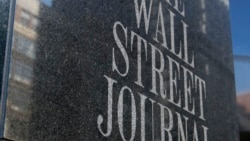Hong Kong's city’s government has warned The Wall Street Journal it may have broken the law by publishing an editorial that said casting blank ballots was one of the "last ways" for residents to voice dissent.
The warning letter, which the U.S. media outlet published on Monday, comes as China's ruling Communist Party transforms the business hub into something more closely resembling the authoritarian mainland.
Erick Tsang, Hong Kong's secretary for constitutional and mainland affairs, took exception to an editorial the Journal ran last week, titled: "Hong Kong Says Vote – or Else."
The editorial previewed the city's legislature election slated for this month that reduces Hong Kong's already limited democratic opportunities.
"Boycotts and blank ballots are one of the last ways for Hong Kongers to express their political views," the Journal wrote in its editorial.
In his letter, Tsang said he was "shocked" to read that sentence and warned that Hong Kong banned "inciting another person not to vote, or to cast an invalid vote."
"We reserve the right to take necessary action," Tsang said, adding that would pursue perceived offenses "irrespective whether the incitement is made in Hong Kong or abroad."
Under a new legislative election system imposed by Beijing, only pre-vetted candidates can stand for office. Twenty of the 90 legislature seats up for grabs are directly elected – down from half.
Most of the city's pro-democracy opposition figures are either in jail, have fled overseas, been barred from standing or declined to take part in the December 19 polls.
Sensitive to any move that might cast doubt over the legitimacy of its new "patriots only" political model, Hong Kong's government recently made it an offense to encourage people to boycott local elections or incite them to cast invalid or spoiled ballots.
That law does not make it illegal for individuals to void ballots or refuse to vote.
Last week authorities issued arrest warrants for two Hong Kong activists living overseas for using social media to call on people not to vote.
Three others within Hong Kong have been arrested for the same offense.
The anti-corruption watchdog has warned pollsters that asking residents whether they intend to boycott the polls could be an offense.
Officials have also warned that organizing a boycott of elections could violate the city's national security law.
In its editorial, the Journal described the polls as a "sham vote" which showed China was "crushing the autonomy it promised" to Hong Kong and was "trying to enforce its political crackdown even overseas."
The Journal has previously riled China with its editorials.
Last year, an opinion piece on the coronavirus was deemed racist by Beijing and resulted in expulsion of three reporters from the country.
Hong Kong has long served as a regional media hub, though it has tumbled down press freedom rankings in recent years as Beijing asserts greater control over the city.
International media including the Financial Times, AFP, CNN, the Journal and Bloomberg all have regional headquarters in the city.




